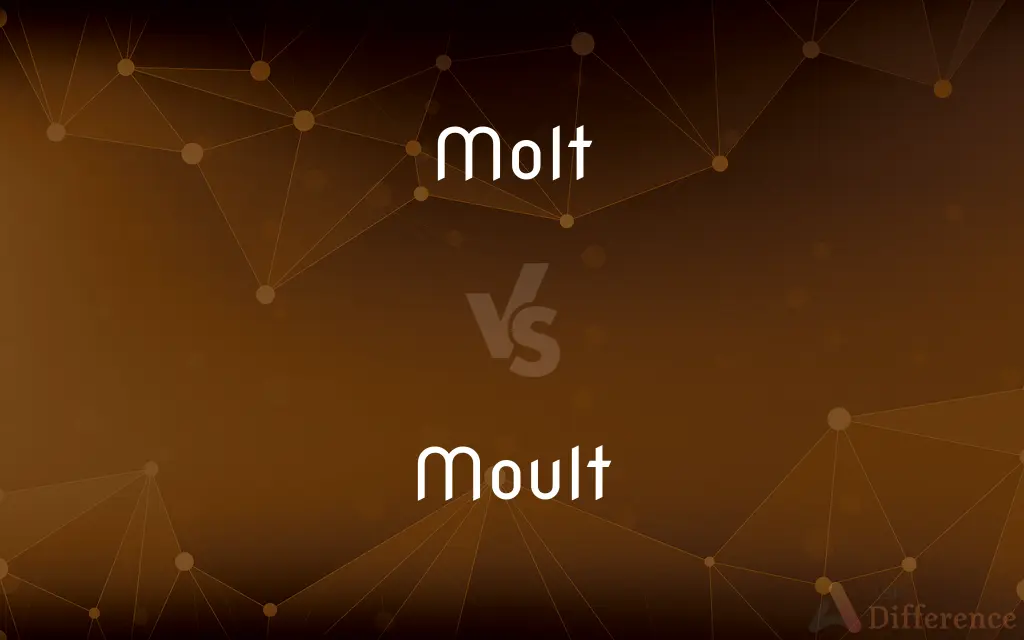Molt vs. Moult — What's the Difference?
By Fiza Rafique & Maham Liaqat — Updated on April 26, 2024
Molt and moult refer to the same biological process of shedding old feathers, skin, or hair for growth; "molt" is preferred in American English, while "moult" is used in British English.

Difference Between Molt and Moult
Table of Contents
ADVERTISEMENT
Key Differences
Molt is the term commonly used in American English to describe the process by which animals shed their old feathers, fur, or skin to allow for new growth. Whereas, moult is the spelling preferred in British English, reflecting regional linguistic preferences. Both terms describe the same natural phenomenon observed in birds, reptiles, and some mammals, highlighting a fascinating aspect of the animal kingdom.
In American literature and scientific journals, "molt" is consistently used, aligning with the general American English spelling conventions that often simplify words. On the other hand, British texts maintain the use of "moult," which follows the more traditional form often seen in British spellings such as colour vs. color or flavour vs. flavor. This difference in spelling does not impact the understanding of the process but indicates the origin of the text or the intended audience.
When discussing the timing and pattern of molting, American English speakers might refer to "molt cycles" or "molt patterns," using the shortened form. Whereas in British contexts, the same discussions would use "moult" to describe these cycles, emphasizing the regional spelling practices without altering the scientific meaning.
Educational materials tailored for American audiences, such as textbooks or wildlife documentaries, will use "molt" to describe this biological process. In contrast, British educational resources adhere to "moult," ensuring consistency with other British English conventions. This distinction helps tailor the content to its audience, though the process remains universally understood among English speakers.
In online search queries or academic research, using "molt" might yield American-centric results, focusing on studies and resources from American institutions. Conversely, searching "moult" may provide insights from British or Commonwealth countries, offering a broader perspective on research and literature in English.
ADVERTISEMENT
Comparison Chart
Spelling
Molt
Moult
Usage in Literature
American texts
British texts
Educational Materials
U.S. schools
U.K. schools
Search Engine Optimization
American websites
British websites
Linguistic Tradition
Simplified spelling
Traditional spelling
Compare with Definitions
Molt
The act of shedding an outer layer.
Molting is essential for the animal to maintain health.
Moult
Shed old feathers, hair, or skin to allow for new growth.
In the UK, birds moult their feathers seasonally.
Molt
The periodic shedding in reptiles and amphibians.
Snakes molt their skin as they grow.
Moult
An integral stage in the development of certain species.
The moult stage is vital for butterfly metamorphosis.
Molt
A phase in an animal's life cycle.
The molt phase is crucial for the crab’s growth.
Moult
The natural phenomenon of shedding.
Moulting is observed across various species in different environments.
Molt
A biological renewal process.
Each molt signifies a renewal phase for the eagle.
Moult
A continuous biological process.
Each moult prepares the animal for the next stage of life.
Molt
Shed old feathers, hair, or skin to make way for new growth.
Birds molt their feathers regularly to ensure effective flight.
Moult
The cyclical process in many animals.
Hedgehogs moult their spines as part of their growth cycle.
Molt
To shed part or all of a coat or an outer covering, such as feathers, cuticle, or skin, which is then replaced by a new growth.
Moult
Variant of molt.
Molt
To shed or cast off (a bodily covering).
Moult
The process of shedding or losing a covering of fur, feathers or skin etc.
Some birds change colour during their winter moult.
Molt
The act or process of molting.
Moult
The skin or feathers cast off during the process of moulting.
Molt
The material cast off during molting.
Moult
(intransitive) To shed or lose a covering of hair or fur, feathers, skin, horns, etc, and replace it with a fresh one.
Molt
Standard spelling of moult
Moult
(transitive) To shed in such a manner.
Molt
To shed or cast the hair, feathers, skin, horns, or the like, as an animal or a bird.
Moult
See Molt.
Molt
To cast, as the hair, skin, feathers, or the like; to shed.
Moult
Periodic shedding of the cuticle in arthropods or the outer skin in reptiles
Molt
The act or process of changing the feathers, hair, skin, etc.; molting.
Moult
Cast off hair, skin, horn, or feathers;
Out dog sheds every Spring
Molt
Periodic shedding of the cuticle in arthropods or the outer skin in reptiles
Molt
Cast off hair, skin, horn, or feathers;
Out dog sheds every Spring
Common Curiosities
What does moult mean?
Moult refers to the same process as molting, but is the preferred spelling in British English.
Is there a difference in the biological process between molt and moult?
No, both terms describe the same biological process in animals.
What is molting?
Molting is the process where animals shed their old feathers, fur, or skin to allow for new growth.
Can the terms molt and moult be used in any English-speaking country?
Yes, both terms are understood, but regional preferences apply for consistency in spelling.
How often do animals molt?
The frequency of molting varies widely among species and can be influenced by factors such as age and environmental conditions.
How do animals behave during molting?
Animals may become more reclusive or inactive during molting due to the vulnerability associated with losing their protective coverings and the energy demands of growing new ones.
Why is molting important for animals?
Molting allows animals to replace worn or damaged feathers, fur, or skin, which is essential for protection and temperature regulation.
Are molt and moult interchangeable in scientific writing?
Yes, they are interchangeable, reflecting only regional spelling differences.
What triggers molting in animals?
Molting is usually triggered by hormonal changes that are influenced by environmental factors, such as changes in temperature or daylight hours.
Which animals undergo molting?
Many animals, including birds, reptiles, and some mammals, undergo molting.
What role does molting play in an animal's life?
Molting is crucial for growth, health, and survival as it allows animals to renew their protective outer coverings and sometimes to prepare for seasonal changes.
Is there a particular season when molting is most common?
For many species, molting commonly occurs during or at the end of the breeding season, but this can vary based on the species and its environment.
Can molting be observed in all bird species?
Yes, all bird species undergo molting at various times throughout the year, although the patterns and frequency can differ significantly.
Share Your Discovery

Previous Comparison
Porcelain vs. Enamel
Next Comparison
Gift vs. PrizeAuthor Spotlight
Written by
Fiza RafiqueFiza Rafique is a skilled content writer at AskDifference.com, where she meticulously refines and enhances written pieces. Drawing from her vast editorial expertise, Fiza ensures clarity, accuracy, and precision in every article. Passionate about language, she continually seeks to elevate the quality of content for readers worldwide.
Co-written by
Maham Liaqat













































